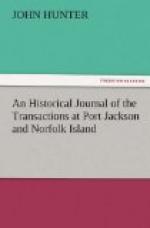Never, upon any service, did there a better, or a more friendly, understanding subsist between different corps, than had ever been the case between the seamen and soldiers employed upon this. When we came near the lower part of the harbour, our friends took leave, and soon after the wind setting in from the sea, we were obliged to anchor until the next morning, when a land wind carried us clear out. The master of the ship had orders from Governor Phillip to call at Norfolk Island, in order to take on board the dispatches of Lieutenant-Governor Ross; but this order was meant only in case it could be done without any material loss of time.
We were in all, on board that little vessel, one hundred and twenty-three souls, victualled for sixteen weeks. We had a very long voyage before us. It was my wish, if possible, to avoid touching at Batavia, in order to prevent sickness among our people, in the very crouded state they were in, which, at the season we should probably be there, was much to be dreaded. I had expressed a desire to pass through amongst the Molucca Islands, and endeavour to call at Timor, for the purpose of watering, and getting such other articles as could be had there; as by the time we could arrive among those islands, the easterly wind would be set in strong; and from thence, to have proceeded as far as I could with the provisions I had, either to the Mauritius, or the Cape of Good Hope.
We therefore could not afford to lose much time in an attempt to call at Norfolk Island; three weeks, however, we persevered in endeavouring to reach it, and had arrived within twenty-five leagues of it, when the wind set in strong from the eastward. I now called the officers and the master of the ship together, to consider of our situation, with respect to water and provisions. We had been fitted out in a very hasty and careless manner, with water-casks built from old worm-eaten staves, which had been laying exposed to the sun for more than a year; so that by the time we had arrived within the above distance of the island, we had lost by leakage full three weeks water, and had every reason to fear the loss of much more from the same cause: it was not therefore time, with a heavy sailing vessel, to attempt beating to windward, in order to reach a place, which we knew we could not gain without a change of wind; and the very great difficulty and uncertainty of getting a supply of water there, determined every one’s opinion in favour of bearing away to the northward.
Much time had already been lost in making the attempt, we therefore steered to the northward, intending to pass between the New Hebrides and Nova Caledonia; but in this intention we were disappointed. Upon making the Isle of Pines, (on the 23d of April,) which lies off the south end of New Caledonia, (the island bore when we made it north,) the wind blew so strong from the northward of east, that we could not weather and pass to the eastward of it. We had not Cook’s Second Voyage on board, so that we had no account of this land, and as I had always understood that the Isle of Pines was a small inconsiderable spot, with many tall pine-trees upon it, we all concluded, that, what afterwards proved really the island was the land which Captain Cook had called the Prince of Wales’s Foreland, and is the south-west part of New Caledonia.




